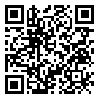BibTeX | RIS | EndNote | Medlars | ProCite | Reference Manager | RefWorks
Send citation to:
URL: http://jdisabilstud.org/article-1-481-en.html
2- Yazd University
Background
The writing skill is learned in the hierarchy of children's ability after listening, speaking and reading. Therefore, any problems in other areas such as listening, speaking and reading can have a negative impact on language learning. Over the years, there have been many ways to treat this disorder, including play therapy which has been used in various fields to combat learning disorders. Dysgraphia is a transcription disability, in the sense that it is a writing disorder associated with impaired handwriting, orthographic coding (orthography, the storing process of written words and processing the letters in those words), and finger sequencing (the movement of muscles required to write). A method to improve behavioral disorders of children is play therapy. This is a correct way to treat such children because they often have difficulty in verbal expression of their feelings. Play therapy reduces barriers and helps children to express their feelings better and learn their control skills. It is a structure approach based on therapeutic theory that establishes learning processes, natural and normal communication of children. Play is the key to the health of children and the correct way to treat them. The impact of play on children's academic achievement and its relation with the ability to write and identify letters as well as helping them to have selective attention during learning makes it clearer from educational and therapeutic aspect. Play therapy is a form of counseling or psychotherapy that uses play to communicate with and help people, especially children, to prevent or resolve psychosocial challenges. This is thought to help them towards better social integration, growth and development, emotional modulation, and trauma resolution. The present study aims at investigating the effectiveness of the recreation therapy strategy on decreasing spelling errors of students with spelling disorders in the first and second grades of primary schools in Yazd.
Material and Methods
In this study the testing procedure was used and the research population was all the students with spelling disorders in Yazd. After performing the diagnostic test (the Riven intelligence test for children and the Fallahchay’s spelling disorder test and Diagnostic Test spelling learning disability) by multi–stage cluster sampling, 20 female students with spelling disorders were selected randomly. Then, they were divided randomly into two groups, the experimental group and the control group. The examiners in experimental group were trained through the recreation therapy strategy for 12 sessions (60 minutes for every session / twice a week), but the control group did not receive any intervention. In this study, descriptive and inferential statistical methods were used (correlation coefficient test, paired t-test, variance test and mean).
Results
The results showed that the analysis of variance for repeated sizes of spelling disorder significantly decreased after treatment by play in children of the experimental group than the control group (p<0.01).
Conclusions
It can be concluded that the recreation therapy strategy decreases the spelling errors of students with spelling disorders. According to the results of this study, play therapy can be recommended to coaches dealing with learning disorders, consultants, and psychologists that try to improve the spelling disorders of students by applying these strategies.
| Rights and permissions | |
 |
This work is licensed under a Creative Commons Attribution-NonCommercial 4.0 International License. |




